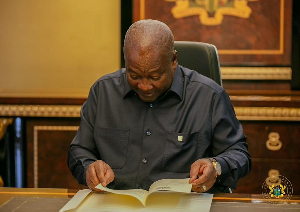Actually, potential economic benefits (tax revenues, and development outcomes) can be derived from small-scale mining. It is also true that small-scale mining is a significant contributor to the economic and social well-being of many people and households in rural, remote, and poor communities in Ghana. But, I am afraid, the way small-scale mining sector is being regulated in Ghana, it does not look promising, it is ill-favoured
For instance, the laws which govern the small-scale mining are somehow confused and inconsistent. Needless to say, all the attention is primarily on large-scale mining. Indeed, the government disregard of the small-scale mining sector may cost the nation dearly in the long run.
Yes, societies at large may be both positively and negatively affected by small-scale mining. The positive effects may include the promotion of efficient resource use, such as extracting ores from small deposits or from tailings, and providing rural incomes. Whereas the negative effects may include water pollution, the release of mercury and other toxic and hazardous wastes into the free environment, and social tensions that can lead to civil unrest.
That said, in order to achieve the maximum benefit, it is extremely important that society as a whole must have an interest in promoting and strengthening the role of small-scale mining in national development. In addition, regulating and strengthening of the developmental potential of the sector must be of heightened importance to the government.
Paradoxically, overlapping and conflicting laws, or laws and regulations that are not based on an understanding of the local context of small-scale mining, hinder and erode the sector’s potential to contribute to sustainable development. For instance, it cannot be concluded that the interests of indigenous people are consistent with those of small-scale miners. More so, while some indigenous people may secure their livelihoods from small-scale mining, there may be other cases in which non-indigenous small scale miners threaten the livelihoods of indigenous people.
For instance, in spite of the fact that by law, only Ghanaians are allowed to obtain mining licenses for small-scale mining operations, “thousands” of Chinese immigrants are working in the small scale mining sector in Ghana.
“The involvement of the Chinese has changed the dynamics of small-scale mining,” the head of the Ghana Chamber of Mines, said in an interview.
“They use bulldozers, pay loaders and really heavy machinery. They have in fact mechanized artisanal mining and as a result the level of environmental devastation is huge.”
Ironically, some Ghanaians are colluding with the Chinese illegal miners to forcibly dig our natural resources. Indeed, this illegal practice is making nonsense of the essence of the promulgation of small-scale mining law in 1989, Pndc l (218). For, the law was enacted to allow native Ghanaians to engage in small-scale mining legally.
True to state that, often, Ghanaians would secure plots of land, and go into partnership with Chinese who have funds to “bring in the bulldozers and all the other big equipment, and then they go in some sort of working arrangement with the local miners.”
Apparently, there are lapses in the 1989 small-scale mining law (PNDCL 218). For example, the law states categorically that no licence for small-scale gold mining operation shall be granted to any person who is not a citizen of Ghana. However, the same law allows Ghanaian licence holders to seek logistics assistance from their foreign minions. Consequently, some Ghanaian licence holders would go beyond the jurisdiction and involve the foreigners in the mining operations.
Obviously, some Ghanaians are complicit with the influx of foreigners in the small-scale mining sector; (For example, see: ‘MP pushes for the arrest of Interior Minister ‘; myjoyonline.com/ghanaweb.com, 04/04/2013).
“The MP’S call comes in the wake of Joy News’ interception of documents indicating that several of the 125 Chinese nationals arrested last week for engaging in illegal small scale mining had legal documents secured from the Interior Ministry, allowing them to work in the mines. The permits were granted by the Interior Ministry’s Quota Committee in June 2010.”
“The MP is also calling for the prosecution of the Chief Executive Officer of Hansol Mining Company, Bernard Antwi-Boasiako, who employed the Chinese.”
“The Hansol company manager himself should be arrested because he knows the law does not permit that,” he told Joy FM’s Top Story on Wednesday.”
Yes, I concur with the said MP; Hansol company manager must be arrested for questioning. For, if he, the manager, has indeed involved Chinese immigrants in the small-scale mining operations, then he has breached the 1989 small-scale mining law.
Indeed, the epochal violations of the small-scale mining law go to show that there is a break down in the sector. For me, the sector requires overhaul. Indeed, better data and policies are needed to get the sector back on track.
Going forward, the 1989 small-scale mining law has to be amended. For example, the amendments must make it unlawful for any Ghanaian to transfer small-scale mining licences to their foreign minions, and must also prohibit allocation of mining lands to the illegal miners.
At the moment, small-scale mining sector is in a mess. Thus, President Mahama must put his foot down and halt all the activities of small-scale mining, and ensure that sanity prevails.
My suggestion may sound too ‘draconian’, but, I am afraid, if care is not taken, some greedy and obnoxious Ghanaians will collapse the sector entirely.
“We are not serious as a nation, are we?”
K. Badu, UK.
Opinions of Friday, 5 April 2013
Columnist: Badu, K.
Why President Mahama Must Suspend Small-Scale Mining
Entertainment











